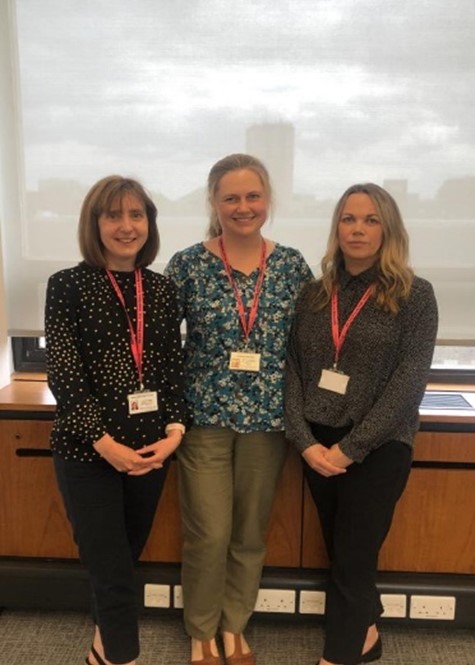SEND Outreach Service- Specific Learning Difficulties Team
SEND Outreach Service- Specific Learning Difficulties Team
The Specific Learning Difficulties (SpLD) Team sits within the area of Cognition and Learning. The team is staffed by three experienced teachers, who were all previously SENCOs and all hold specialist qualifications for teaching and assessing pupils with SpLD (dyslexia).
In partnership with mainstream schools across Newcastle, the team provides advice and support to improve the outcomes for children and young people who have significant and persistent difficulties in literacy and maths.
As well as training to develop a whole school approach to supporting learners with dyslexia/literacy difficulties the team can provide individual assessments.
A prior diagnosis of dyslexia or any other Specific Learning Difficulty is not necessary to access this service.
For more information, please click the drop-down menus below.
- Meet the team

Katie Stone, Suzy Hattaway and Nicki Cook
- How we support schools
-
Training
• Dyslexia Awareness
• DyscalculiaDrop Ins
Assessments
• Where there is evidence of persistent difficulties and lack of progress despite the provision of appropriate support and intervention work, individualised assessment work can be provided to indicate the likelihood of dyslexia or dyscalculia.
- Key Facts- Dyslexia
-
Dyslexia is a common Specific Learning Difficulty/Difference (SpLd) that can cause problems with reading, writing, and spelling. Having a SpLD does not mean that a child/young person cannot achieve and succeed in learning. They may, however, need additional help and support.
Although the signs of dyslexia are different for everyone, indications include:
• difficulties with reading, writing and spelling
• difficulties with phonological awareness e.g., rhyme, alliteration, segmenting and blending, linking sounds to letters
• understands information when told verbally, but has difficulty comprehending information when it is written down
• sequencing difficulties e.g., writing letters in the incorrect order
• difficulties with fine motor/handwriting skills
• short term and working memory difficulties
• difficulty planning and organising tasks
• difficulty with time perception
Well-founded intervention can make a difference and most learners with a profile of dyslexia will respond to support.
It is important to note that many children/young people with dyslexia will have a range of strengths and talents.
- Key Facts - Dyscalculia
-
Dyscalculia is a specific and persistent difficulty in understanding numbers.
Although the signs of dyscalculia are different for everyone, indications include:
• poor number sense – may rely on rote learning
• struggles with estimating and rounding
• difficulties with reasoning – struggles to see patterns and make connections
• cannot see the relationship between numbers
• difficulty in matching the numerical symbol to the numerical quantity
• poor mental arithmetic skills
• difficulties in remembering and recalling mathematical facts and procedures, even with extensive practice
• struggles to count backwards
• calculations may take a long time to complete
• the inability to tell whether answers are right or nearly right
• difficulties keeping track of steps when problem-solving
- Resources for families
-
Click here to view our Padlet for Specific Learning Difficulties (SpLD)
- Resources for practitioners
-
Click here to view our Padlet for Specific Learning Difficulties (SpLD)
- Events and training
-
Dyslexia Awareness Week
Dyslexia Awareness Week 2023 - British Dyslexia Association (bdadyslexia.org.uk)
- Useful websites and resources
-
- British Dyslexia Association (bdadyslexia.org.uk)
- Dyslexia - NHS (www.nhs.uk)
- Dyscalculia - British Dyslexia Association (bdadyslexia.org.uk)
Books: At Home with Dyslexia (Sascha Roos)
- British Dyslexia Association (bdadyslexia.org.uk)
- Working definitions
-
Dyslexia
The following is the working definition of dyslexia as provided in the Rose report (2009) that has been adopted by schools and settings:
• Dyslexia is a learning difficulty that primarily affects the skills involved in accurate and fluent word reading and spelling.
• Characteristic features of dyslexia are difficulties in phonological awareness, verbal memory and verbal processing speed.
• Dyslexia occurs across the range of intellectual abilities.
• It is best thought of as a continuum, not a distinct category, and there are no clear cut-off points.
• Co-occurring difficulties may be seen in aspects of language, motor coordination, mental calculation, concentration, and personal organisation, but these are not, by themselves, markers of dyslexia.
• A good indication of the severity and persistence of dyslexic difficulties can be gained by examining how the individual responds or has responded to well-founded intervention.' (Rose, 2009)Dyscalculia
The working definition of dyscalculia has been provided by the British Dyslexia Association:
• Mathematics difficulties are best thought as a continuum, not a distinct category, and they have many causal factors.
• Dyscalculia falls at one end of the spectrum and will be distinguishable from other maths issues due to the severity of difficulties with number sense, including subitising, symbolic and non-symbolic magnitude comparison and ordering.
• It can occur singly but often co-occurs with other specific learning difficulties, mathematics anxiety and medical conditions.
(BDA Definition)
